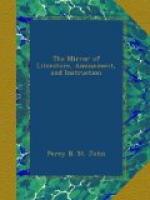It is remarkable also, that Harding came to life again, and was carried to Bridewell, and the next day to Newgate, where several people visited him and gave him money, who were very inquisitive whether he remembered the manner of his execution; to which he replied, he could only remember his having been at the gallows, and knew nothing of Venham being with him.
G. K.
* * * * *
LOVE AND JOY.
AN ALLEGORY.
In the happy period of the golden age when all the celestial inhabitants descended upon the earth and conversed familiarly with mortals, among the most cherished of the heavenly powers were twins, the offspring of Jupiter, Love, and Joy. Wherever they appeared, flowers sprung up beneath their feet, the sun shone with a brighter radiance, and all nature seemed embellished by their presence; they were inseparable companions, and their growing attachment was favoured by Jupiter, who had decreed that a lasting union should be solemnized between them as soon as they arrived at mature years. But in the meantime, the sons of men deviated from their native innocence; vice and ruin over-ran the earth with giant strides; and Astrea with her train of celestial visitants, forsook their polluted abode; Love alone remained, having been stolen away by Hope, who was his nurse, and conveyed by her to the forest of Arcadia, where he was brought up amongst the shepherds. But Jupiter assigned him a different partner, and commanded him to espouse Sorrow, the daughter of Ate. He complied with reluctance, for her features were harsh, her eyes sunken, her forehead contracted into perpetual wrinkles, and her temples encircled with a wreath of cypress and wormwood. From this union sprung a virgin, in whom might be traced a strong resemblance to both her parents; but the sullen and unamiable features of her mother were so blended with the sweetness of the father, that her countenance, though mournful, was highly pleasing. The maids and shepherds gathered round and called her Pity. A red-breast was observed to build in the cabin where she was born; and while she was yet an infant, a dove, pursued by a hawk, flew for refuge into her bosom. She had a dejected appearance, but so soft and gentle a mien, that she was beloved to enthusiasm. Her voice was low and plaintive, but inexpressibly sweet; and she loved to lie for hours on the banks of some wild and melancholy stream singing to her lute. She taught men to weep, for she took a strange delight in tears; and often when the virgins of the hamlet were assembled at their evening sports, she would steal in among them and captivate their hearts by her tales of charming sadness. She wore on her head a garland, composed of her father’s myrtles twisted with her mother’s cypress. One day as she sat musing by the waters of Helicon, her tears by chance fell into the spring; and ever since, the muses’




